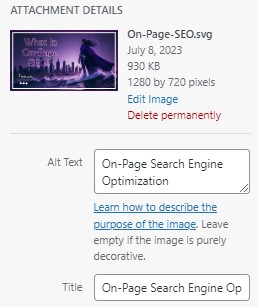Gaining proficiency in optimizing individual webpages for search engine results is essential for any service-oriented business that wants to be seen on the internet today. This intricate practice involves optimizing individual pages of your website, ensuring they rank high on search engine results pages and attract relevant traffic.
This comprehensive guide delves deep into the world of on-page SEO. We’ll explore everything from keyword research and its effective utilization to creating quality content that resonates with your target audience.
We will also uncover advanced techniques such as schema markup, image optimization, and understanding emotional appeal and user experience signals. You’ll also learn to effectively incorporate brand names into page titles while optimizing the character count.
Furthermore, we’ll introduce you to tools like Semrush for detailed analysis of your web pages and free resources like Xenu’s link crawler. Lastly but importantly, emphasizing continuous learning about the latest SEO trends is key for sustained success in this ever-evolving field.
Keyword Research and Optimization
Keyword research is finding and analyzing search terms that people enter into search engines, often for search engine optimization (SEO) or general marketing.
Keyword research can provide valuable insights into the queries your target audience is searching on Google (or other search engines). The objective is to optimize your content around those keywords to rank higher in search engine results, attract more traffic, and convert that traffic into customers.
Here’s a general process for conducting keyword research for your website:
- Define your goals: Before starting, you must understand your website’s goals. Are you trying to sell a product, provide information, promote a service, or something else?
- List relevant topics: Based on your website’s goals, list the main categories you want to rank. For example, if you run a fitness blog, these could be “nutrition,” “workouts,” “supplements,” etc.
- Find keywords for these topics: You need to find keyword phrases that potential customers might search for. These should be related to the categories you identified in the previous step. If your business is location-specific, these could be broader terms, long-tail keywords (more specific phrases), and local SEO keywords. Use tools like Google’s Keyword Planner, SEMrush, Ahrefs, or Moz’s Keyword Explorer.
- Analyze search volume and competition: Once you have a list of potential keywords, analyze the search volume (how often they are searched) and competition (how difficult it would be to rank for them) for these keywords. Again, you can use tools like Keyword Planner or Ahrefs for this. This step will help you prioritize keywords likely to deliver the best return on investment.
- Consider search intent: Understand the intent behind the keyword. Does the user want information? Are they looking to make a purchase, or are they simply browsing? Align your content with the intent to have better chances at ranking.
- Analyze the keywords your competitors are ranking for: It’s also beneficial to look at which keywords your competitors rank for. This can give you additional ideas and help you identify gaps in your content.
- Choose your keywords: Based on the above analysis, select your keywords. These should be relevant to your website, have a high search volume, low competition (if possible), and align with the user’s search intent.
- Implement these keywords into your website: Once you’ve identified them, incorporate them. This could be in the page titles, meta descriptions, headers, content, URLs, and image alt text.
- Monitor your results: Finally, use an SEO tool to track how your website ranks for these keywords over time. Google Search Console is a valuable tool for this. Adjust your strategy as necessary based on your results.
Remember, keyword research isn’t a one-time exercise. You should repeat this process regularly to keep up with changes in search behavior. Also, don’t overstuff your content with keywords, as it can lead to penalties from search engines. The goal is to create valuable content that’s genuinely useful to your audience.
Titles and Headings: The Keyword VIPs
Your page titles and headings are like the bouncers at a club – they let search engines and visitors know what your pages are all about. So, make sure to include important keywords related to your business. For pet care businesses, it’s important to include relevant terms like “dog grooming,” “cat grooming,” or “pet spa” in titles and headings.
Keywords in Content: The Secret Sauce
Don’t just stop at titles and headings. Spread those keywords like confetti throughout your content. But remember, don’t go overboard – search engines hate keyword stuffing. Be natural and witty, and use synonyms or variations of your main keywords. Instead of just “dog grooming,” try “canine care” or “pet pampering.” It’s like giving your content a fancy makeover.
By using keywords effectively, you’ll not only make your text more engaging but also increase its visibility on search engine results pages (SERPs). And hey, SEO isn’t just about getting any traffic – it’s about attracting the right traffic. You desire visitors who are truly captivated by what you can give.
Boost your website’s visibility with on-page SEO. Learn how to optimize keywords, titles, and content for better search engine rankings.
Why Quality Content Reigns Supreme
Quality website content provides substantial value to the user, meets their needs, and delivers a positive experience. Its content attracts, engages, and retains readers’ attention while adhering to SEO best practices.
Creating Original, High-Quality Content
Several factors define what is considered “quality” content:
- Relevance and Context: Quality content should be relevant to the reader and fit your website’s context. It should align with the user’s search intent, providing the information they want.
- Originality: The content should be unique and original, not copied or duplicated from other sources. Plagiarized or spun content can harm your website’s reputation and SEO.
- Accuracy and Reliability: Quality content should be factually accurate and reliable. It should be well-researched and trustworthy. This is especially important for websites that deal with health, legal, financial, or other sensitive topics.
- Value: It should provide value to the reader, such as actionable insights, comprehensive information, or entertainment. The primary goal should be to meet the user’s needs, not just promote your products or services.
- Readability and Structure: Quality content is easy to read and understand. It should be structured to make it accessible to the reader, using headers, bullet points, and short paragraphs. Good grammar, punctuation, and spelling are also important.
- Visual Appeal: Using relevant images, infographics, videos, and other visual content can improve the user experience and make the content more engaging.
- Optimized for SEO: While the primary focus should always be the user, quality content follows SEO best practices. This includes using relevant keywords, meta tags, and alt tags, as well as mobile optimization and fast loading times.
- Updated Regularly: The Internet is constantly evolving, and what’s considered accurate today might not be tomorrow. Therefore, quality content is regularly updated to remain relevant and accurate.
- Engagement: High-quality content typically encourages engagement, such as likes, shares, comments, and time spent on the page.
- Call to Action: The content should guide the reader towards taking a specific action, whether signing up for a newsletter, purchasing, or sharing the content with their network.
Quality content is the cornerstone of successful digital marketing and SEO strategies. By providing high-quality content, you can attract more visitors, improve your search engine rankings, and increase the likelihood of conversions on your website.
Regularly Updating Your Website with New Material
Freshness matters. Regular updates signal to search engines like Google that your site is alive and kicking. Regular updates can give you an edge over static websites, whether adding new blog posts, updating old articles with current information, or introducing new products or services.
Besides improving visibility on SERPs (Search Engine Results Pages), quality content fosters trust among visitors, leading to higher conversion rates. Neil Patel, one of the top influencers in digital marketing, emphasizes this aspect extensively.
To sum up: strive for originality, relevance, and freshness when crafting your webpage’s content, as these factors significantly contribute to effective on-page Search Engine Optimization.
Note: While focusing on quality, don’t forget keyword optimization – they go hand-in-hand.
Boost your website’s search engine rankings with high-quality, original content. Stay fresh and relevant to stand out in the digital world.
Advanced On-page Techniques
On-page SEO is vast and ever-evolving, with new techniques being introduced regularly. Schematic markup and image optimization are two advanced methods to boost your website’s visibility.
Using Schema Markup for Better Search Engine Comprehension
Schema markup helps search engines understand your web page’s content better. Adding this to your HTML code clarifies what your data means. For example, if you run an event-based business like a music festival or conference, using Event schema helps Google grasp details like date, location, and ticket availability. This improves comprehension and boosts click-through rates (CTR) as users get more information from the SERPs.
Optimizing Images with Descriptive Alt Texts
Images are essential for user engagement, but search engines can’t ‘see’ them. They rely on alt texts to understand images. Writing descriptive alt texts ensures that even if the image doesn’t load or someone uses screen reader software due to visual impairment, they still know what it represents.
As a website designer, I have seen everything from no alt text to keyword stuffed alt text. Both extremes are not SEO friendly. The alt text and title for the image at the top of this post are:

In addition to providing context for search engines and accessibility support for visually impaired users, optimizing images involves compressing them without compromising quality. Large files slow down page loading times – something both users and Google dislike. Tools like TinyPNG can help reduce file size while maintaining good visual quality. Remember: faster pages contribute positively towards ranking.
There are 2 new image formats that are significantly smaller with equal resolution for websites. They are WEBP and SVG. Either of these formats will allow your website to load faster than traditional JPG or PNG. Several plugins will convert JPG or PNG to WEBP if your website is in WordPress. Canva will save images in SVG format.
Boost your website’s visibility with advanced on-page SEO techniques like schema markup and image optimization.
Emotional Appeal & UX Signals
They play a significant role in optimizing your site for better rankings. It’s about creating an engaging environment that resonates with users and appeals to search engine algorithms.
Crafting Emotionally Appealing Title Tags
Title tags are more than just keywords. They can be like a catchy pick-up line that makes users click. Try livening up your title tags with words like “staggering” or “unique” to pique interest and arouse enthusiasm.
Understanding Keyword Frequency
Keywords are like spices in your content. Use them wisely, or Google might think you’re spamming. Yoast’s article on keyword density offers valuable advice on how to find the right balance.
Beyond these techniques, linking to credible sources adds value to your webpage. It shows you’re not just making things up and provides more information for curious visitors.
Emotional title tags and proper keyword usage are key to improving UX signals and climbing the search engine ladder. So, let’s get emotional and optimize.
Boost your website’s rankings with emotionally appealing title tags and strategic keyword usage for a better user experience.
Page Titles & Brand Names
Optimizing titles can significantly increase the visibility and click-through rate of your website.
Brand names in page titles: the perfect combo
Your page title, also known as the title tag, is one of the first things search engines look at. Including your brand name here helps build recognition and trust. But don’t go overboard – find that sweet spot between keywords and readability.
Keep it short and sweet, under 160 characters
The ideal length for a page title is around 50-60 characters. Anything longer might get chopped off in search results. Don’t shout or stuff in too many words. Instead, create concise and descriptive titles that accurately represent your webpage.
For example: “Premium Websites, Inc. – Pro Website Design & Hosting.” It includes our company name and clearly states what we do – all within the character limit.
Optimizing your website’s meta elements like these boosts rankings and helps build a strong online brand. Paying attention to these details can greatly impact today’s ever-changing digital landscape.
Optimize your website’s visibility and click-through rates with well-crafted page titles and brand names. Find the perfect combo for SEO success.
Tools For Analyzing Your Content
In the digital age, a strong online presence is necessary for businesses. But how do you know if your content is killing it? Luckily, some excellent tools help you evaluate and enhance your web pages.
Get the lowdown with Semrush
Semrush is a top-notch tool that gives you all the juicy details about your website’s performance. It spills the beans on organic search traffic, backlinks, keyword rankings, and more. Armed with this info, you can spot areas that need a boost and make smart decisions to supercharge your SEO strategy.
Fix those broken links with Xenu’s Link Sleuth
If you’re on a tight budget or just starting out with SEO, check out Xenu’s Link Sleuth. This nifty tool sniffs out broken links on your website – a sneaky little problem that can mess with user experience and tank your search engine rankings.
And hey, plenty of other platforms like Moz Pro and Ahrefs offer similar services. Each one has its own bag of tricks to suit different needs. So pick the one that tickles your fancy and helps you conquer the SEO game.
Realize each tool’s particularities and opt for those that jive with your firm’s long-term aspirations. Continuous improvement is the secret sauce for successful on-page SEO practices recognized worldwide.
Boost your website’s performance with these top-notch SEO tools. Analyze, optimize, and conquer the search engine game.
Continuing Education in SEO Practices
Service-based business owners must stay updated with the latest SEO practices in the ever-evolving digital landscape. The field of search engine optimization is dynamic and constantly changing. As such, continuous learning becomes an essential aspect of mastering SEO.
Emphasizing Continuous Learning About Latest SEO Trends
Education doesn’t stop once your website goes live. It’s an ongoing process of keeping up with industry trends and algorithm updates. Check out resources like Search Engine Land to stay in the loop.
The AskDotty membership will keep you up-to-date on all the new SEO strategies.
Mastering Basic Principles for Successful Implementation
Stay ahead by having a strong foundation in fundamental concepts. Understand how keyword research works, optimize page titles, and craft emotionally appealing title tags. Tools like Semrush can help analyze your content better.
Recall a website optimized correctly isn’t just about bringing in visitors – it’s also about offering them value and ensuring they stay.
FAQs about On-Page Search Engine Optimization
What is on-page search engine optimization?
On-page SEO involves optimizing individual web pages to rank higher and earn more relevant traffic in search engines.
What are search engine optimization articles?
Search Engine Optimization (SEO) articles are content pieces that use specific strategies to improve visibility on search engines, attract organic traffic, and boost website ranking.
How does on-page optimization help in SEO?
On-page optimization helps in SEO by improving a site’s relevancy signals for search engines, leading to better rankings, increased visibility, and improved user experience.
What is an example of on-page optimization?
An example of on-page optimization is incorporating relevant keywords into webpage titles, headers, and meta descriptions and creating high-quality original content.
Conclusion
Mastering On-Page SEO is crucial for service-based business owners who want to boost their website’s visibility and organic traffic.
By conducting thorough keyword research and optimization, creating top-notch content, using advanced techniques like schema markup and optimizing images with alt texts, crafting emotionally appealing title tags, effectively incorporating brand names into page titles, leveraging tools for content analysis, and staying up-to-date with the latest SEO trends, businesses can ensure that their webpages are search engine optimized and provide an excellent user experience.



